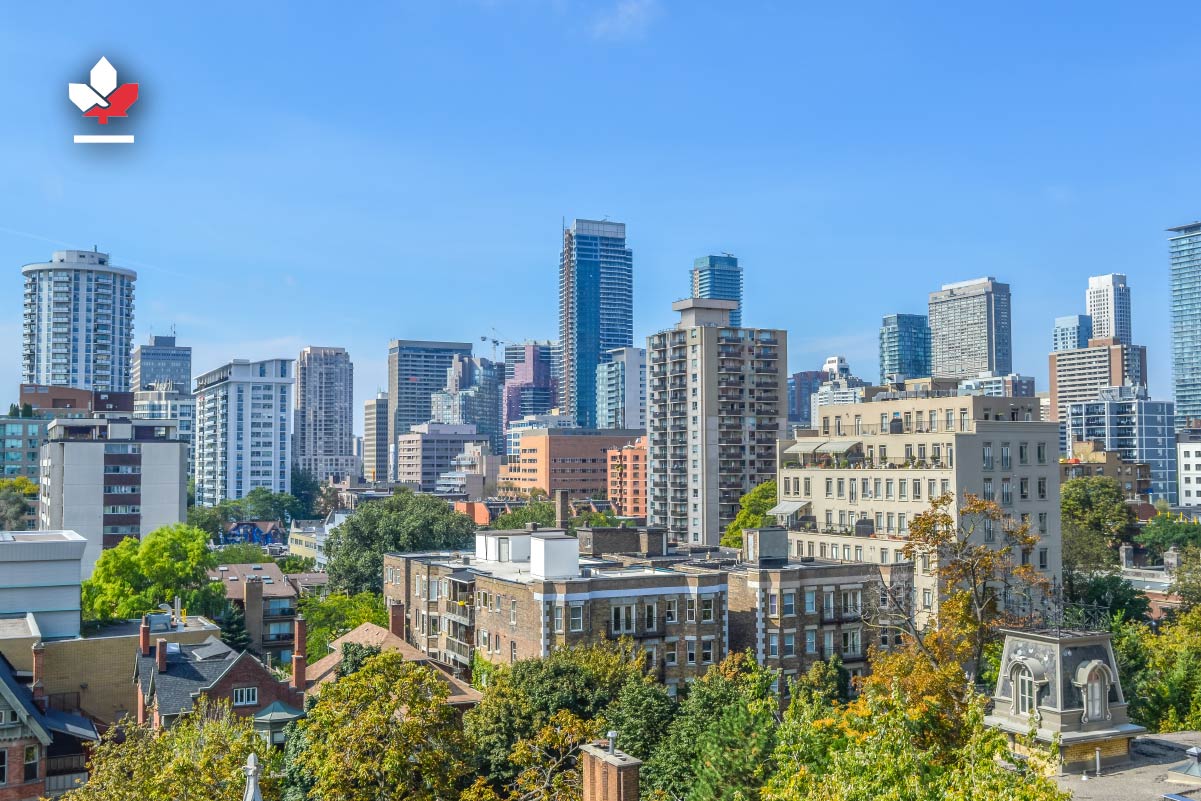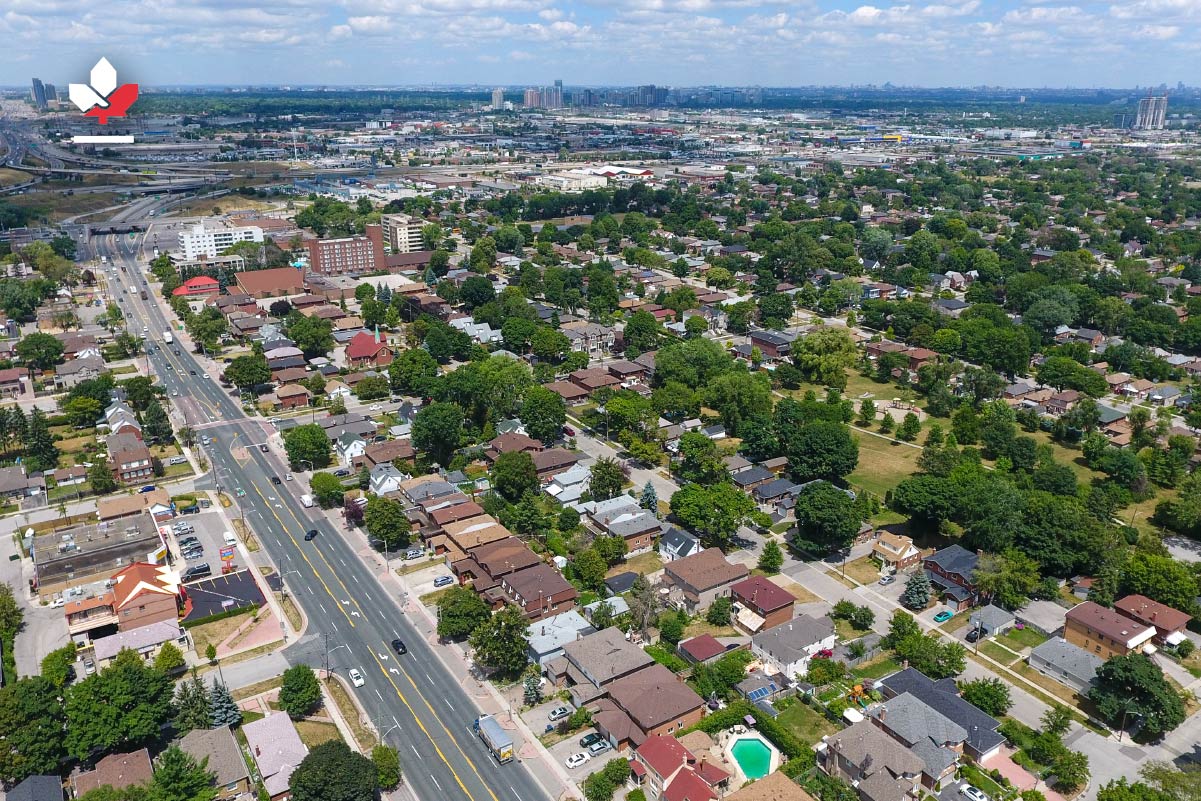Toronto's Housing Market
January 30, 2024
|
Are you contemplating entering the city of Toronto's real estate scene when you move to Canada? Then, you are in for an exciting journey. Toronto's Housing Market has been a hot topic for a while, drawing the attention of potential homebuyers and investors alike.
The allure of Toronto, Ontario's dynamic metropolis, extends far beyond its renowned skyline and diverse cultural landscape. For many, owning a piece of this vibrant city through its ever-evolving housing market is a dream worth pursuing. Working through Toronto's real estate offering can be thrilling and daunting whether you are a seasoned investor or a first-time buyer. This comprehensive guide provides the tools and insights you need to embark on your journey toward entering the Toronto Housing market.
Toronto's Housing Market

If you plan to move to Canada and settle in Toronto, you must learn more about what has been happening in the Greater Toronto Area (GTA) housing scene. Here are some insights to note.
Home Sales in Toronto
According to the Toronto Regional Real Estate Board (TRREB), 2023 saw a drop in GTA home sales. Only 65,982 homes were sold. This is a 12.1% drop from the previous year. The big issue? It was expensive! High mortgage rates and tough rules made it hard for many to own a home. However, The TRREB is hopeful, predicting lower mortgage rates in 2024, which will boost the housing market.
New homes up for grabs have been pretty much the same for the past ten years, even as more people move in. The TRREB says sales perked up in November, but new listings dropped for three months.
Good News for Buyers and a Look Ahead
The average price for all homes in 2023 was 1,126,604 CAD, down 5.4% from 2022. Month-by-month data showed that prices nudged up a bit, but it is expected that prices might go up again If borrowing costs go down in 2024. With more newcomers to Toronto expected in the next few years, there will be a great need for properties to rent or buy.
Learn more about Canada’s housing solutions.
Buying a House in Toronto

The process of buying a house in Toronto is multifaceted, demanding meticulous planning and preparation. We look at what you must do to enter the Toronto housing market.
Starting Your Real Estate Journey in Toronto
It is a good idea to start by establishing your budget and desired timeline. Research different neighborhoods, exploring diverse options from the established charm of Cabbagetown to the modern buzz of Liberty Village. Familiarize yourself with different housing types, from the iconic detached houses to the convenient condominium units.
Find a Reputable Toronto Real Estate Agent
Once you have identified your ideal home, engage with reputable Toronto real estate agents. These local experts act as your guides, taking you through the intricacies of the market, negotiating advantageous deals, and streamlining paperwork. Be sure to choose an agent you feel comfortable with, someone who understands your needs and communicates effectively.
Secure Finance
Once you have found one of many Toronto real estate agents available, you must secure financing. Toronto has many mortgage lenders, so finding the best one for your needs is important. Some of the best mortgage lenders in Toronto include Scotiabank, TD Canada Trust, and RBC Royal Bank.
Challenges and Opportunities
Toronto's housing market presents both challenges and opportunities. Rising interest rates and competitive bidding situations remain hurdles for first-time buyers. However, Toronto is a worthwhile investment with a stable job market, diverse housing options, and long-term growth potential.
| Challenges | Opportunities |
|---|---|
| Affordability: Toronto is still quite pricey, even though prices have eased a bit. With rising interest rates, home ownership seems far off for many hopeful residents. | Market Correction: Recent price stability could be a chance for buyers, creating a more predictable and less inflationary environment for entry. |
| Inventory Crunch: Finding a home that suits your needs is tough, especially for detached homes and affordable options. Bidding wars are common, forcing buyers to face tough competition and potentially inflated prices. | Renting as a Stepping Stone: While owning is the goal, the strong rental market provides a practical bridge, allowing income generation and time to save for future purchases. |
| Choosing the Right Area: Toronto has diverse neighborhoods, each with its charm and cost. Working through this diversity to find the perfect location within your budget can be overwhelming. | Government Support: Initiatives like the First-Time Home Buyer Incentive provide crucial financial aid, making homeownership more achievable for a broader range of individuals. |
| Foreign Buyer Tax: International investors face an extra cost and complexity with the Non-Resident Land Transaction Tax. | Innovation and Variety: New housing options like micro-condos and co-living arrangements are emerging, offering creative solutions for those entering the market at a lower price point. |
Top Neighborhoods in Toronto

Toronto's dynamic metropolis is filled with a contagious energy, offering its residents and visitors a variety of experiences. But beyond the iconic skyline and bustling downtown core lies a kaleidoscope of distinct neighborhoods, each with its own story. From historic havens steeped in Victorian charm to trendy spots buzzing with youthful vibrancy, the city’s neighborhoods cater to every whim and lifestyle. Take a look at the top neighborhoods in Toronto.
The Annex
Situated between Bloor Street and Dupont Street, this historic gem is a haven for bookworms and academics, thanks to its proximity to the University of Toronto. Grand Victorian homes line the leafy streets, while charming cafes, independent bookstores, and antique shops add to the intellectual ambiance.
Leslieville
This trendy neighborhood east of downtown Toronto is a magnet for young professionals. Quaint Victorian houses rub shoulders with modern condos, while hip cafes, trendy restaurants, and stylish boutiques line the bustling streets. With its vibrant energy and diverse offerings, Leslieville is a dynamic hub for young Torontonians.
Rosedale
Exuding timeless elegance, Rosedale is one of Toronto's most affluent neighborhoods. Lush green spaces like Rosedale Park and ravine trails provide a serene escape, while grand mansions and stately homes showcase the area's architectural heritage. Upscale shops and gourmet restaurants cater to discerning residents, making Rosedale a haven for those seeking a refined lifestyle.
The Beaches
As the name suggests, this idyllic neighborhood is all about waterfront living. Golden sandy beaches like Kew-Balmy Beach and Woodbine Beach beckon sunseekers, while the scenic boardwalk offers stunning views of Lake Ontario. Family-friendly parks, charming cafes, and bustling markets complete the picture, making The Beaches a delightful escape from the urban bustle.
Yorkville
Synonymous with luxury and glamor, Yorkville is a playground for the affluent. Upscale designer boutiques like Prada and Gucci line the streets, while Michelin-starred restaurants and chic bars cater to discerning palates. The iconic Bloor Street boasts a vibrant art scene, while the Royal Ontario Museum and Gardiner Museum offer cultural immersion. Yorkville is a playground for the sophisticated and a must-visit for those seeking a taste of Toronto's high life.
FAQs
What Are the Restrictions For Foreign Investors Who Want to Buy Canadian Real Estate?
Foreign investors who want to buy Canadian real estate face some restrictions. The Prohibition on the Purchase of Residential Property by Non-Canadians Act, brought into effect in January 2023, prohibits foreign investors from buying residential property in Canada for two years. The ban prohibits foreign buyers from purchasing land, condos, single-family homes, or very small buildings in metropolitan areas of at least 100,000 people.
However, there are exceptions to this ban. For example, temporary residents on valid study or work permits can still purchase a home in Canada. Additionally, the ban does not apply to properties outside census metropolitan areas, and foreign investors are still allowed to purchase recreational properties such as cottages and vacation homes. Furthermore, non-Canadians who buy a home with a Canadian spouse or common-law partner, or those who inherit a house following a death, are also exempt from the ban.
What is the Average Home Price in Toronto?
According to Canadian personal finance encyclopedia WOWA.ca, the average price of a detached home in the Greater Toronto Area was 1,418,323 CAD in December 2023, a 2% increase year-over-year. Semi-detached home prices also increased 2% year-over-year to an average price of 1,027,432 CAD.
On the other hand, freehold townhouses are seeing prices at 996,162 CAD, up 4% year-over-year. Condo apartments were the only property type to see an annual decrease in prices, down 3% year-over-year to 682,525 CAD.
